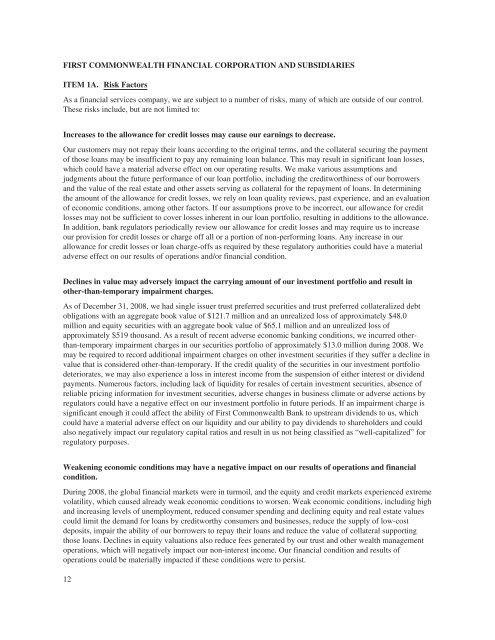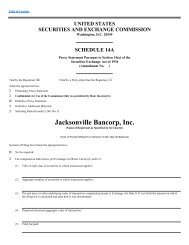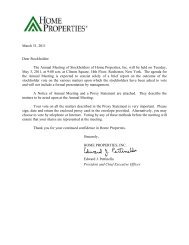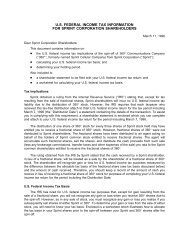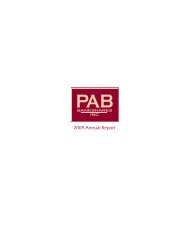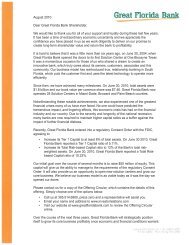Strength and Stability - SNL Financial
Strength and Stability - SNL Financial
Strength and Stability - SNL Financial
You also want an ePaper? Increase the reach of your titles
YUMPU automatically turns print PDFs into web optimized ePapers that Google loves.
FIRST COMMONWEALTH FINANCIAL CORPORATION AND SUBSIDIARIES<br />
ITEM 1A. Risk Factors<br />
As a financial services company, we are subject to a number of risks, many of which are outside of our control.<br />
These risks include, but are not limited to:<br />
Increases to the allowance for credit losses may cause our earnings to decrease.<br />
Our customers may not repay their loans according to the original terms, <strong>and</strong> the collateral securing the payment<br />
of those loans may be insufficient to pay any remaining loan balance. This may result in significant loan losses,<br />
which could have a material adverse effect on our operating results. We make various assumptions <strong>and</strong><br />
judgments about the future performance of our loan portfolio, including the creditworthiness of our borrowers<br />
<strong>and</strong> the value of the real estate <strong>and</strong> other assets serving as collateral for the repayment of loans. In determining<br />
the amount of the allowance for credit losses, we rely on loan quality reviews, past experience, <strong>and</strong> an evaluation<br />
of economic conditions, among other factors. If our assumptions prove to be incorrect, our allowance for credit<br />
losses may not be sufficient to cover losses inherent in our loan portfolio, resulting in additions to the allowance.<br />
In addition, bank regulators periodically review our allowance for credit losses <strong>and</strong> may require us to increase<br />
our provision for credit losses or charge off all or a portion of non-performing loans. Any increase in our<br />
allowance for credit losses or loan charge-offs as required by these regulatory authorities could have a material<br />
adverse effect on our results of operations <strong>and</strong>/or financial condition.<br />
Declines in value may adversely impact the carrying amount of our investment portfolio <strong>and</strong> result in<br />
other-than-temporary impairment charges.<br />
As of December 31, 2008, we had single issuer trust preferred securities <strong>and</strong> trust preferred collateralized debt<br />
obligations with an aggregate book value of $121.7 million <strong>and</strong> an unrealized loss of approximately $48.0<br />
million <strong>and</strong> equity securities with an aggregate book value of $65.1 million <strong>and</strong> an unrealized loss of<br />
approximately $519 thous<strong>and</strong>. As a result of recent adverse economic banking conditions, we incurred otherthan-temporary<br />
impairment charges in our securities portfolio of approximately $13.0 million during 2008. We<br />
may be required to record additional impairment charges on other investment securities if they suffer a decline in<br />
value that is considered other-than-temporary. If the credit quality of the securities in our investment portfolio<br />
deteriorates, we may also experience a loss in interest income from the suspension of either interest or dividend<br />
payments. Numerous factors, including lack of liquidity for resales of certain investment securities, absence of<br />
reliable pricing information for investment securities, adverse changes in business climate or adverse actions by<br />
regulators could have a negative effect on our investment portfolio in future periods. If an impairment charge is<br />
significant enough it could affect the ability of First Commonwealth Bank to upstream dividends to us, which<br />
could have a material adverse effect on our liquidity <strong>and</strong> our ability to pay dividends to shareholders <strong>and</strong> could<br />
also negatively impact our regulatory capital ratios <strong>and</strong> result in us not being classified as “well-capitalized” for<br />
regulatory purposes.<br />
Weakening economic conditions may have a negative impact on our results of operations <strong>and</strong> financial<br />
condition.<br />
During 2008, the global financial markets were in turmoil, <strong>and</strong> the equity <strong>and</strong> credit markets experienced extreme<br />
volatility, which caused already weak economic conditions to worsen. Weak economic conditions, including high<br />
<strong>and</strong> increasing levels of unemployment, reduced consumer spending <strong>and</strong> declining equity <strong>and</strong> real estate values<br />
could limit the dem<strong>and</strong> for loans by creditworthy consumers <strong>and</strong> businesses, reduce the supply of low-cost<br />
deposits, impair the ability of our borrowers to repay their loans <strong>and</strong> reduce the value of collateral supporting<br />
those loans. Declines in equity valuations also reduce fees generated by our trust <strong>and</strong> other wealth management<br />
operations, which will negatively impact our non-interest income. Our financial condition <strong>and</strong> results of<br />
operations could be materially impacted if these conditions were to persist.<br />
12


